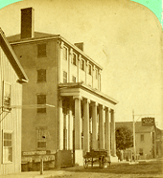At its founding in 1834, the Theological Institute of Connecticut (now Hartford Seminary) decided to depend on small gifts “from persons of moderate means,” according to The Memorial History of Hartford County, CT 1633-1884. But after several years of depending on such gifts and finding the support lacking, the institute welcomed a gift of $11,000 from Miss Rebecca Waldo of Worcester, MA, as a “pledge of necessary endowments.”
What do we know of Miss Waldo? Women’s History Month seems like a good time to learn about the woman who gave the first endowed gift to a theological seminary that would, in 1889, become the first in America to accept women.
An article in Religion and American Culture: A Journal of Interpretation (University of California, 1998) tells us that Rebecca Waldo, her sister Sarah Waldo, and their aunt Elizabeth Salisbury were well-known in Worcester because they “defied gender conventions by challenging the authority of their minister” after they were excluded from participating in his selection. “Rather than ‘trifle with holy time,’ as Elizabeth Salisbury expressed it, [the three women] withdrew from the First Church to found the (Congregational) Calvinist Church, sparking an acrimonious debate over the nature of authority within the church,” the journal states.
Rebecca Waldo, Sarah Waldo, and Elizabeth Salisbury had unusual agency for women at the time because they were wealthy. The photo accompanying this article shows the Worcester house where the Waldo sisters lived with their brother, Daniel Waldo.
“The unmarried Waldo sisters had inherited large sums of money, and by 1827, each was assessed at more than $35,000,” according to the journal article. “Barred by their sex from holding formal positions of leadership and power in the community, these economically independent women asserted themselves in the town church.”
After a lengthy series of conflicts over the leadership of First Church, the women claimed they had the freedom to “decide on our own hearts,” just as “all others [enjoy] the free exercise of the rights of their own consciences.” They argued that “natural law … was impressed by the finger of God” and gave them freedom of thought and action, superseding human law.
With some male allies, the Waldo sisters and their Aunt Elizabeth, who was even wealthier, were able to form their own church and insist on “universal adulthood suffrage” in the election of ministers. In the 1820s, most of those seeking to transfer to the new church were women, “thereby rejecting the presumption of female submission to the male church hierarchy.”
As the church in Worcester grew into the 1830s, the Theological Institute of Connecticut was just finding its footing, and it hoped to fund itself with small annual gifts instead of larger ones that might create an endowment. A description of this approach can be found in the Memorial of the Semi-Centenary Celebration of the Founding of the Hartford Theological Seminary, published in 1884.
“By some influential members of the board permanent funds were looked upon with distrust. Had they not in many cases been perverted?” the memorial says. At the time, the sentiment was, “Let us shun this danger. We will rely on the annual gifts of those whose hearts are with us.”
The first year of this approach was successful when 328 subscribers contributed gifts ranging from $750 to 14 cents. After that, it became more difficult to collect sufficient funds ever year. So when Rebecca Waldo contributed $11,000 in 1839, the year before her death, the gift “was hailed with peculiar joy” and “from that time little was openly said against permanent endowments.”
Almost two centuries later, during Women’s History Month, we thank Miss Rebecca Waldo for setting Hartford Seminary on the healthy financial footing it maintains today. We also welcome any additional information about Rebecca Waldo (1771-1840) or her family. Please contact Susan Schoenberger, Director of Communications, at sschoenberger@hartsem.edu.

 Sign-up now ›
Sign-up now ›